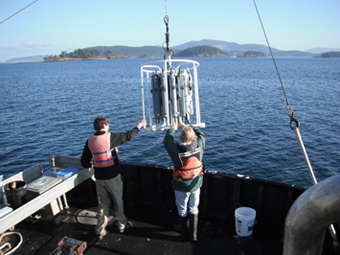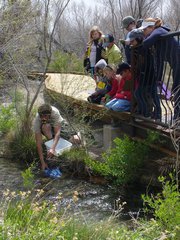
| Jeremy Cohen, Ph.D. Post-Doc |
||
|
Contact Information Office: SCA 137 Google Scholar: Click here Wildlife Photography: Click here EducationPh.D. Biology, University of South Florida, 2011-2016
|
|
Research Broadly, I’m interested in how climate and climate change impact host susceptibility to disease. My projects have focused on looking at how factors controlling disease distribution change at varying spatial scales, examining which climate factors predict prevalence of chytrid fungus in the field, and investigating how climate change controls phenological shifts in animals. A lot of my research involves the use of Geographic Information Systems (GIS), large scale macroecological data, and spatial statistics. I’ve also conducted a number of experiments examining how temperature and temperature variability (expected to increase with climate change) affects amphibian host susceptibility to chytrid fungus.
Publications Cohen, J.M., Lajuenesse, M.J., Rohr, J.R. 2018. A global synthesis of phenological responses to climate change. Nature Climate Change, 8: 224-228. PDF Rohr, J.R., Civitello, D.J., Cohen, J.M., Roznik, E.A.†, Sinervo, B., Dell, A.I. 2018. The complex drivers of thermal acclimation and breadth in ectotherms. Ecology Letters, 21: 1425–1439. Cover article. PDF Cohen, J., Venesky, M., Sauer, E., Civitello, D., McMahon, T., Roznik, B., Rohr, J. 2017. The thermal mismatch hypothesis explains host susceptibility to an emerging infectious disease. Ecology Letters, 20 (2), 184-193. () Cohen, J., Civitello, D., Venesky, M., McMahon, T., Rohr, J. An interaction between climate change and infectious disease drove widespread amphibian extinctions. In review. Johnson, L.R., Gramancy, R.B., Cohen, J., Mordecai, E., Murdock, C., Rohr, J.R., Ryan, S.J., Stewart, A.M., Weikel, D. 2018. Phenomenological forecasting of disease incidence: a dengue case study. Annals of Applied Statistics, 12: 27-66. Mordecai, E., Cohen, J., Evans, M., Gudapati, P., Johnson, L., Miazgowicz, K., Murdock, C., Rohr, J., Ryan, S., Savage, V., Shockett, M., Stewart, A., Thomas, M., Weikel, D. Predicting human cases of Zika, dengue and chikungunya using mechanistic temperature models. Plos Neglected Tropical Diseases, 11, e0005568. Cohen, J., Civitello, D., Brace, A., Feichtinger, E., Ortega, N., Richardson, J., Sauer, E., Rohr, J. 2016. Spatial scale modulates the strength of ecological processes driving disease distributions. Proceedings of the National Academy of Sciences, 113, E3359-E3364.(PDF+Supplement) Civitello, D., Cohen, J., Fatima, H., Halstead, N., Liriano, J., McMahon, T., Ortega, N., Sauer, E., Sehgal, T., Young, S., Rohr, J. 2015. Reply to Salkeld et al.: Diversity-disease patterns are robust to study design, selection criteria, and publication bias. Proceedings of the National Academy of Sciences, 112, E6262.(PDF) Civitello, D.J., Cohen, J., Fatima, H., Halstead, N.T., Liriano, J., McMahon, T.A., Ortega, C.N., Sauer, E., Sehgal, T., Young, S., Rohr, J.R. 2015. Biodiversity inhibits parasites: broad evidence for the dilution effect. Proceedings of the National Academy of Sciences, 112, 8667-8671. (PDF) Li, Y., Cohen, J.M., Rohr, J.R. 2013. A review and synthesis of the effects of climate change on amphibians. Integrative Zoology 8:145-161. (PDF,Supplementary Materials) O'Brien, D.T., Norton, C., Cohen, J., Wilson, D.S. 2014. Local Adaptation in Community Perception: How Background Impacts Judgments of Neighborhood Safety. Environment and Behavior, 46, 213-240. PresentationsInvited departmental seminar: Cohen, J. Climate change drives outbreaks of infectious disease across spatial and temporal scales. Wildlife conservation department, University of Florida, October 2017. Cohen, J., Lajeunesse, M., Rohr, J. (Talk) A global synthesis of phenological responses to climate change. Ecological Society of America, Portland, Oregon, August 2017. Cohen, J., Venesky, M., Sauer, E., Civitello, D., McMahon, T., Rohr, J. (Talk) Outbreaks of the amphibian chytrid fungus Batrachochytrium dendrobatidis are controlled by host adaptations to climate. World Congress of Herpetology 8, Hangzhou, China, August 2016. Cohen, J., Venesky, M., McMahon, T., Civitello, D., Rohr, J. (Talk) Outbreaks of the amphibian chytrid fungus Batrachochytrium dendrobatidis are controlled by host adaptations to climate. Society for Integrative and Comparative Biology, Portland, OR, January 2016. Cohen, J., Civitello, D., Brace, A., Feichtinger, E., Ortega, N., Richardson, J., Sauer, E., Rohr, J. (Talk) Spatial Scale Drives Process and Pattern: Support for a Classic Hypothesis in Macroecology. Ecological Society of America, Baltimore, MD, August 2015. Cohen, J., Venesky, M., Sauer, E., Civitello, D., McMahon, T., Rohr, J. (Poster) The thermal mismatch hypothesis explains outbreaks of an emerging infectious disease. NSF Macrosystems meeting, Arlington, VA, September 2016. Cohen, J., Civitello, D., Brace, A., Feichtinger, E., Ortega, N., Richardson, J., Sauer, E., Rohr, J. (Poster) Spatial Scale Drives Process and Pattern: Support for a Classic Hypothesis in Macroecology. (a) NSF Macrosystems meeting, Arlington, VA, August 2015. (b) VectorBite meeting, Clearwater, FL, March 2016. AwardsUSF Outstanding dissertation award for 2016-2017 academic year. Award is only given to top 3 dissertations out of ~300 PhD graduates in academic year. Also awarded $1,000. October 2017. Disease Section, Ecological Society of America. Best student paper of 2015-2016 academic year (Spatial scale modulates the strength of ecological processes driving disease distributions, Proceedings of the National Academy of Sciences). Awarded $150. August 2016. University of South Florida Graduate School. Dissertation completion fellowship. Awarded $10,000 + tuition waiver for two semesters. January 2016. Porter Family Foundation. Research Grant. Awarded $500 for research supplies. October 2016. University of South Florida Integrative Biology Department. Departmental travel grant (awarded twice). Awarded $450 for travel each time. October 2015 & 2016. NOAA Dengue Forecasting Challenge. One of three teams (of 17) invited to speak in Washington, D.C. (lead author Dr. Leah Johnson). September 2015. The National Zoo, Baltimore, MD. Rohr Lab (Univ. South Florida) Proposal title: Atelopus spp. Research Results and Proposal: Does temperature variability impact the susceptibility of Atelopus spp. to disease? Awarded 160 captive-bred Atelopus zeteki for research purposes. August 2014.
|
||


